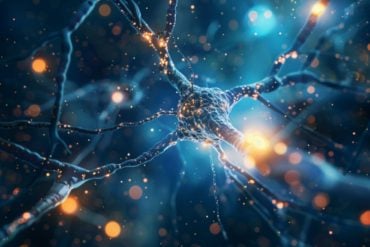Summary: A new study finds that oxytocin, the “cuddle hormone,” can reduce acute feelings of loneliness and enhance bonding in group therapy settings for individuals experiencing chronic loneliness.
While not a cure-all, oxytocin shows promise as a supportive tool during therapy, potentially helping patients better navigate the initial challenges of addressing their loneliness.
Key Facts:
- Oxytocin reduced acute feelings of loneliness during group therapy sessions.
- The hormone enhanced positive bonding between group members.
- Oxytocin could be a valuable tool to support patients in the early stages of therapy.
Source: University of Bonn
Loneliness is not a disease. And yet it is a significant health problem. Depression, heart disease or dementia—people who are permanently lonely have a higher risk of becoming ill.
The team led by Dr. Jana Lieberz from the University Hospital Bonn (UKB), who also conducts research at the University of Bonn, and Prof. Dr. Dirk Scheele (Ruhr University Bochum) have investigated how loneliness can be specifically combated.
In a controlled study, in which the universities of Oldenburg, Bochum, Freiburg and Haifa (Israel) were also involved, 78 women and men who felt lonely were given the so-called “cuddle hormone” oxytocin as a nasal spray.
The paper is published in the journal Psychotherapy and Psychosomatics.

Everyone is probably familiar with loneliness, a negative feeling that arises when one’s own social relationships are perceived as insufficient in terms of quantity or quality.
However, if it persists, it can be associated with many mental and physical illnesses. Despite this, there has been a lack of effective interventions to reduce chronic loneliness in those affected.
Senior authors Dr. Lieberz and Prof. Dr. Scheele, together with first author Ruben Berger (UKB), have now investigated whether the bonding hormone oxytocin could help to increase the effectiveness of group therapy against loneliness in a recent study.
In the proof-of-concept study, participants underwent five weekly group therapy sessions, which were supplemented by the administration of oxytocin in the form of a nasal spray. A control group received a placebo preparation.
Participants’ perception of their own feelings of loneliness was assessed at the beginning of the study, after all sessions had been completed and again at two follow-up points (three weeks and three months). In addition, acute feelings of loneliness, stress levels, quality of life and the therapeutic relationship were assessed at each session.
The senior author of the study, Dr. Lieberz, summarizes, “The psychological intervention was associated with a reduced perception of stress and an improvement in general loneliness in all treatment groups, which was still visible at the follow-up examination after three months.”
Oxytocin did not have a significant effect on generally perceived loneliness, quality of life or perceived stress. However, compared to placebo, the participants who had received oxytocin reported a reduced acute feeling of loneliness after the sessions. In addition, oxytocin administration improved positive bonding between group members.
“This is a very important observation that we made—oxytocin was able to strengthen the positive relationship with the other group members and reduce acute feelings of loneliness right from the start. It could therefore be helpful to support patients with this at the start of psychotherapy.
“This is because we know that patients can initially feel worse than before starting therapy as soon as problems are named. The observed effects of administering oxytocin can in turn help those affected to stay on the ball and continue,” explains Dr. Lieberz.
The psychologist emphasizes that oxytocin should not be seen as a panacea—and that therapy is by no means always necessary to reduce loneliness. Although no long-term effects of oxytocin administration were observed in the study, the results of the study suggest that oxytocin can be used to achieve positive effects during interventions.
Further studies are now required to determine optimal intervention designs so that the observed acute effects of oxytocin can be translated into long-term benefits.
About this loneliness and oxytocin research news
Author: Petra Sandow
Source: University of Bonn
Contact: Petra Sandow – University of Bonn
Image: The image is credited to Neuroscience News
Original Research: Open access.
“Oxytocin-Augmented Modular-Based Group Intervention for Loneliness: A Proof-Of-Concept Randomized Controlled Trial” by Ruben Berger et al. Psychotherapy and Psychosomatics
Abstract
Oxytocin-Augmented Modular-Based Group Intervention for Loneliness: A Proof-Of-Concept Randomized Controlled Trial
Introduction: Loneliness poses a significant health problem and existing psychological interventions have shown only limited positive effects on loneliness. Based on preliminary evidence for impaired oxytocin signaling in trait-like loneliness, the current proof-of-concept study used a randomized, double-blind, placebo-controlled design to probe intranasal oxytocin (OT) as an adjunct to a short-term modular-based group intervention for individuals suffering from high trait-like loneliness (HL, UCLA Loneliness Scale ≥55).
Methods: Seventy-eight healthy HL adults (56 women) received five weekly group psychotherapy sessions. HL participants received OT or placebo before the intervention sessions. Primary outcomes were trait-like loneliness measured at baseline, after the intervention, and again at two follow-up time points (3 weeks and 3 months), and, assessed at each session, state loneliness (visual analog scale), perceived stress (Perceived Stress Scale, PSS-10), quality of life (World Health Organization Five Well-Being Index, WHO-5), and the therapeutic relationship (Group Questionnaire, GQ-D).
Results: The psychological intervention was associated with significantly reduced perceived stress and improved trait-like loneliness across treatment groups, which was still evident at the 3-month follow-up. OT had no significant effect on trait-like loneliness, quality of life, or perceived stress. However, compared to placebo, OT significantly facilitated the decrease in state loneliness within sessions and significantly improved positive bonding between the group members.
Conclusion: Despite significantly improved trait-like loneliness after the intervention, OT did not significantly augment this effect. Further studies are needed to determine optimal intervention designs to translate the observed acute effects of OT into long-term benefits.






